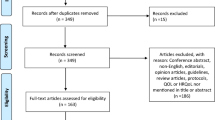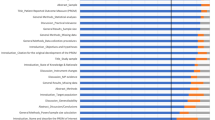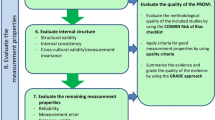Abstract
Standardization in the choice of quality of life (QOL) instruments and their application in randomised clinical trials have been advocated and generally accepted. However, there is now an urgent need to address the problems relating to the analysis and presentation of the data thus generated. There are intrinsic difficulties associated with QOL data, namely its multidimensional nature, attrition and missing data, and there is no consensus as to how these problems should be dealt with. This paper therefore considers there problems using interim data from a large Medical Research Council randomised trial in patients with small cell lung cancer and a poor prognosis, in which attrition and compliance are major concerns. Three possible approaches to the analysis of these data, which use different subsets of patients, are examined in detail. The strengths and weaknesses of these three methods are discussed, and examples of their use in the literature are given and compared with other reported approaches. The need for a standard definition of compliance is also emphasised, and a method of presentation suggested. The best current advice is that QOL data should be analysed in a number of different ways, and conclusions reached only when consistency is seen.
Similar content being viewed by others
References
De Haes JCJM, Van Knippenberg FCE and Neijt JP. Measuring psychological and physical distress in cancer patients: structure and application of the Rotterdam Symptom Checklist. Br J Cancer 1990; 62:
Zigmond AS and Snaith RP. The Hospital Anxiety and Depression Scale. Acta Psychol Scand 1983; 67: 361–70.
Maguire P and Selby P. Assessing the quality of life in cancer patients. Br J Cancer 1989; 60: 437–40.
Aaronson NK. Quality of life assessment in clinical trials: methodologic issues. Controlled Clinical Trials 1989; 10: 195S-208S.
Cella DF and Tulsky DS. Measuring quality of life today: methodological aspects. Oncology 1990; 4: 29–38.
Gotay CC, Korn EL, McCabe MS et al. Quality of life assessment in cancer treatment protocols: Research issues in protocol development. J Natl Cancer Inst 1992; 84: 575–9.
Moinpour CM, Feigl P, Metch B et al. Quality of life end points in cancer clinical trials: review and recommendations. J Natl Cancer Inst 1989; 81: 485–95.
Fletcher A., Gore S, Jones D et al. Quality of life measures in health care. II Design, analysis and interpretation. BMJ 1992; 305: 1145–8.
Davis CS. Semi-parametric and non-parametric methods for the analysis of repeated measurements with applications to clinical trials. Stats in Medicine 1991; 10: 1959–80.
Rochon J. Sample size calculations for two-group repeated-measures experiments. Biometrics 1991; 47: 1383–98.
Agresti A. A survey of models for repeated ordered categorical response data. Stats in Medicine 1989; 8: 1209–24.
Liang K and Zeger SL. Longitudinal data analysis using generalized linear modles. Biometrika 1986; 73: 13–22.
Zeger SL and Liang K. Longitudinal data analysis for discrete and continuous outcomes. Biometrics 1986; 42: 121–30.
Zeger SL, Liang K and Albert PS. Models for longitudinal data: a generalized estimating equation approach. Biometrics 1988; 44: 1049–60.
Zwindermann AH. The measurement of change of quality of life in clinical trials. Stats in Medicine 1990; 9: 931–42.
Kay R. A Markov model for analysing cancer markers and disease states in survival studies. Biometrics 1986; 42: 855–65.
Zwindermann AH. Statistical analysis of longitudinal quality of life data with missing measurements. Qual Life Res 1992; 1: 219–24.
Matthews JNS. A refinement to the analysis of serial data using summary measures. Stats in Medicine 1993; 12: 27–37.
Geddes DM, Dones L, Hill E et al. Quality of Life during chemotherapy for small cell lung cancer: assessment and use of a daily diary card in a randomized trial. Eur J Cancer 1990; 26: 484–92.
Earl HM, Rudd RM, Spiro SG et al. A randomised trial of planned versus as required chemotherapy in small cell lung cancer: a Cancer Research Campaign trial. Br J Cancer 1991; 64: 566–72.
Torrance GW. Health status index models: a unified view. Management Sci 1987; 22: 990–1001.
Gelber RD and Goldhirsch A. New endpoint for the assessment of adjuvant therapy in postmenopausal women with operable breast cancer. J Clin Oncol 1986; 4: 1772–9.
Feldstein ML. Quality of life adjusted survival for comparing cancer treatments. Cancer 1991; 67: 851–4.
Stewart AL, Hays RD and Ware JD. The MOS Short-form General Health Survey. Med Care 1989; 26: 724–35.
Schneiderman ED, Kowalski CJ and Willis SM. Regression imputation of missing values in longitudinal data sets. Internatl J Bio-Med Computing 1993; 32: 121–33.
World Health Organization. WHO handbook for reporting results of cancer treatment. WHO offset publication No 48, WHO, Geneva, 1979.
Medical Research Council Lung Cancer Working Party. Survival, adverse reactions and quality of life during combination chemotherapy compared with selective palliative treatment for small cell lung cancer. Respir Med 1989; 83: 51–8.
Medical Research Council Lung Cancer Working Party. Controlled trial of twelve versus six courses of chemotherapy in the treatment of small cell lung cancer. Br J Cancer 1989; 59: 584–90.
Medical Research Council Lung Cancer Working Party. A randomised trial of 3 or 6 courses of etoposide cyclophosphamide methotrexate and vincristine or 6 courses of etoposide and ifosphamide in small cell lung cancer (SCLC). I survival and prognostic factors. Br J Cancer 1993; 68: 1150–6.
Medical Research Council Lung Cancer Working Party. A randomised trial of 3 or 6 courses of etoposide cyclophosphamide methotrexate and vincristine or 6 courses of etoposide and ifosphamide in small cell lung cancer (SCLC). II Quality of life. Br J Cancer 1993; 68: 1157–66.
Medical Research Council Lung Cancer Working Party. A randomised trial of etoposide cyclophosphamide methotrexate and vincristine versus etoposide and vincristine in the palliative treatment of patients with small cell lung cancer (SCLC) and poor prognosis. Lung Cancer 1994; 11(Suppl 1): 100, abstract 378.
Stephens RJ. Quality of Life (QL) in randomised clinical trials: are the doctors' assessments as valid as the patients'? Lung Cancer 1994; 11(Suppl 1): 81, abstract 307.
Sprangers MG, te Velde A, Aaronson NK et al. Quality of Life Following Surgery for Colorectal Cancer. Psycho-Oncology 1993; 2: 247–59.
Sadura A, Pater J, Osoba D, et al. Quality of life assessment: Patient compliance with questionnaire completion. J Natl Cancer Inst 1992; 84: 1023–6.
Coates A, Gebski V, Bishop JF et al. Improving the quality of life during chemotherapy for advanced breast cancer. A comparison of intermittant and continuous treatment strategies. N Eng J Med 1987; 317: 1490–5.
Yancik R, Edwards BK and Yates JW. Assessing the quality of life of cancer patients: practical issues in study implementation. J Psychosocial Oncol 1989; 7: 59–74.
Ganz PA, Haskell CM, Figlin RA et al. Estimating the quality of life in a clinical trial of patients with metastatic lung cancer using the Karnofsky Performance Status and the Functional Living Index-Cancer. Cancer 1988; 61: 849–56.
Hurny C, Bernhard J, Joss R et al. Feasibility of quality of life assessment in a randomized phase III trial of small cell lung cancer—a lesson from the real world. Ann Oncol 1992; 3: 825–31.
Tannock IF, Boyd NF, DeBoer G et al. A randomized trial of two dose levels of cyclophosphamide, methotrexate and fluorouracil chemotherapy for patients with metastatic breast cancer. J Clin Oncol 1988; 6; 1377–87.
Kaasa S, Mastekaasa A and Naess S. Quality of life of lung cancer patients in a randomized clinical trial evaluated by a psychosocial well-being questionnaire. Acta Oncologica 1988; 27: 335–42.
Stoker MJ, Dunbar GC and Beaumont G. The SmithKline Beecham ‘quality of life’ scale: a validation and reliability study in patients with affective disorder. Qual Life Res 1992; 1: 385–95.
Wallace LM, Priestman SG, Dunn JA et al. The quality of life of early breast cancer patients treated by two different radiotherapy regimens. Clin Oncol 1993; 5: 228–33.
Anderson H, Hopwood P, Prendiville J et al. A randomised study of bolus vs continuous pump infusion of ifosfamide and doxorubicin with oral etoposide for small cell lung cancer. Brit J Cancer 1993; 67: 1385–90.
Richards MA, Hopwood P, Ramirez AJ et al. Doxorubicin in Advanced Breast Cancer: Influence of Schedule on Response, Survival and Quality of Life. Eur J Cancer 1992; 28A: 1023–8.
Scheithauer W, Rosen H, Kornek G-V et al. Randomised comparison of combination chemotherapy plus supportive care with supportive care alone in patients with metastatic colorectal cancer. BMJ 1993; 306: 752–5.
Schipper H, Clinch J, McMurray A, Levitt M. Measuring the quality of life in cancer patients: the functional living index-cancer. Development and validation. J Clin Oncol 1984; 2: 472–83.
Morris JN, Suissa S, Sherwood S et al. Last Days: a study of the quality of life of terminally ill cancer patients. J Chron Dis. 1986; 39: 47–62.
Schumacher M, Olschewski M and Schulen G. Assessment of quality of life in clinical trials. Stats in Medicine 1991; 10: 1915–30.
Author information
Authors and Affiliations
Additional information
P. Hopwood is supported by the Cancer Research Campaingn.
This paper is based on a presentation given by one of the authors (PH) at the British Psychosocial Oncology Group Conference in December 1992.
This paper is given on behalf of the MRC Lung Cancer Working Party whose members are Bleehen N. M., Bolger J. J., Clark P. I., Girling D. J., Hasleton P. S., Hopwood P., Macbeth F. R., Machin D., Moghissi K., Saunders M. I., Stephens R. J., Thatcher N. (Chairman) and White R. J.
Rights and permissions
About this article
Cite this article
Hopwood, P., Stephens, R.J. & Machin, D. Approaches to the analysis of quality of life data: experiences gained from a Medical Research Council Lung Cancer Working Party palliative chemotherapy trial. Qual Life Res 3, 339–352 (1994). https://doi.org/10.1007/BF00451726
Received:
Accepted:
Issue Date:
DOI: https://doi.org/10.1007/BF00451726




